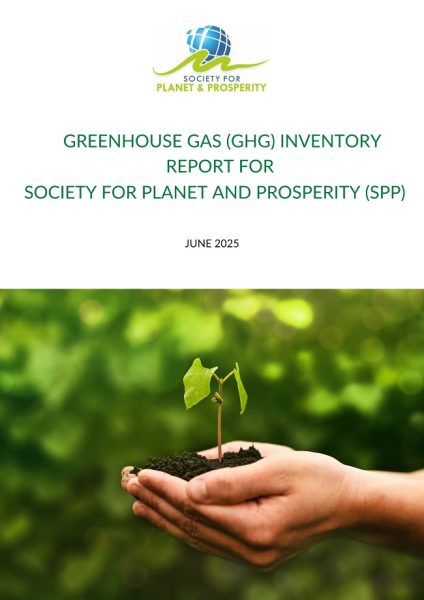The Society for Planet and Prosperity (SPP), a Nigerian registered environmental NGO, has set a new benchmark for corporate climate accountability with the publication of its 2024 Greenhouse Gas Emissions Report.

Under Sections 19 and 24 of Nigeria’s Climate Change Act (2021), organisations with 50 or more employees, as well as all public entities, are legally required to implement measures that reduce carbon emissions annually and to report on their progress, which implies the need for emissions reduction assessment.
Although these provisions of the Act are yet to be widely enforced, SPP’s proactive assessment and disclosure set an important precedent for compliance and accountability across private and public sectors. By voluntarily disclosing its own footprint, the organisation has demonstrated not only compliance but true leadership.
In a statement to the press, the President of SPP, Prof. Chukwumerije Okereke, stressed the importance of these sections of the Climate Change Act, which seek to hold organisations to account and enforce environmental responsibility.
“Policy without enforcement is a promise unkept. By publishing our own emissions report and laying out clear time-bound reduction targets, we are proving that environmental responsibility begins with accountability. I am proud that SPP is leading this vital transformation,” he said.
According to SPP’s audit, the organisation emitted 2.011 tonnes CO₂ equivalent from February 1, 2024 to January 31, 2025.
The report details SPP’s emission profile, identifying four high emission hotspots: diesel generator use, petrol‐fuelled vehicles as staff travel between field sites and policy forums, single-use bottles purchased to guarantee safe drinking water, and the large energy draw of video-conferencing infrastructure, accounting for 86.1 % of the total emission.
The report goes further to outline next steps to be taken in order to achieve the organisation’s commitment to attain 30% emissions reduction by 2030. To achieve this, the organisation aims to instal solar equipment to reduce diesel reliance, eliminate bottled-water purchases by installing on-site water purification systems and halving webinar-related emissions by optimizing meeting relevance.
SPP’s Executive Director, Mr. Edwin Orugbo, emphasised the report’s broader significance and expressed hope that it will inspire other organisations to follow suit.
“We are under no illusion that change is easy. However, we hope that this report will inspire a nationwide shift toward real sustainability as organisations across sectors prioritise emissions tracking and sustainability reporting,” he said.
As part of its commitment to climate action, Nigeria aspires to attain net zero by 2060. The country’s NDCs 2.0 target also aimed at 20% unconditional GHG reduction, and 47% conditional reduction. These targets which may change in its NDCs 3.0 can only be attained through whole-of-society actions.
“SPP’s exemplary action is therefore expected to motivate Nigeria’s public and private sectors to engage in audits of their emissions and subsequently take action to reduce their carbon footprints in line with the country’s targets, and in compliance with Mission 1.5 degrees of the Paris Agreement,” disclosed the group.
This report can be downloaded via the SPP website: https://bit.ly/4kH1Wun
By Ugochukwu Uzuegbu, Communication Specialist, Society for Planet and Prosperity
